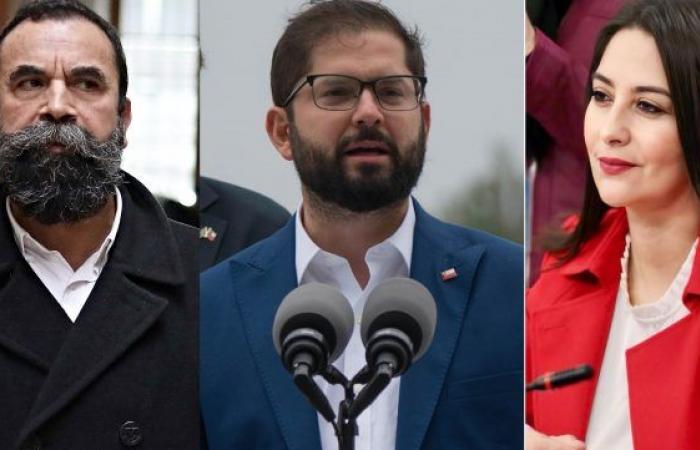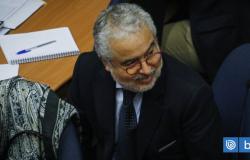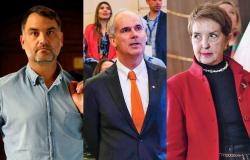A new episode in the escalation of divergences between the Communist Party (PC) and President Gabriel Boric, due to opposing views on the governments of Venezuela and the Summit for Peace in Ukraine, occurred yesterday.
In The centurythe official newspaper of the PC, a report highlighted that “not all the countries attending the so-called ‘Summit for Peace in Ukraine’ agreed to subscribe to the conclusions of a text promoted by NATO leaders,” adding that “only 79 of the 92 governments attending the meeting in Lucerne, Switzerland, signed the document” and that in favor of it “signed, among others, the representations of the United States, France, Germany, Italy, the right-wing governments of Argentina and Ecuador, to which the Government of Chile joined,” the media reported.
And the relationship between President Boric and the Communist Party is going through its coldest moment in three years of Government. This is how it is interpreted in the ruling party, where they observe a spiral of tension between the two, which began on June 1 and increased due to the divergences regarding the policy of the Kremlin and the Miraflores Palace, which became evident in the presidential tour. for Europe.
In effect, the differences between the store and the Head of State date back to the Public Account of June 1. That day the senator Daniel Núñez (PC) He expressed that with the abortion proposal “the transformative story of the government program reappeared.” And that same afternoon, at the event for the 112th anniversary of the PC, – with the ambassadors of Russia and Venezuela in the front row – its leader, Lautaro Carmona, warned – amidst applause – that “loyalty is not obedience”in relation to some critical views on La Moneda’s agenda.
However, the biggest confrontation began last week, as a result of the appreciation of said regimes, to the point that CP sources say that the President challenged the communists when, last Wednesday, he stated that “we do not act for considerations of short term” and that there is no “double standard” in matters of human rights.
Another turning point was the President’s criticism of the Russian ruler, Vladimir Putin, whom he did not hesitate to describe as the leader of an “imperialist, expansionist” country, specifying that he finds it “very surprising” that there are sectors in Latin America that, “Perhaps due to a historical misunderstanding,” they believe that Russia is a “reference source for the left in the world,” in circumstances where Putin – he stated – “is rather allied with far-right forces.”
Later, prior to the bilateral meeting he held with the president of Ukraine, he sent a direct message to the Communist Party, pointing out that “Chile’s foreign policy is defined by the President of the Republic. Political parties are free to give their opinion on the matter, but the President is the one who makes the decisions. (…) We have acted based on principles and not short-term considerations or who is in power during a certain moment when human rights have been violated or democracy has been weakened,” he said.
After that, he reviewed the regime of Nicolás Maduro, which he has always criticized, which has intensified following the statements of the Attorney General of Venezuela, who has assured that the murder of former lieutenant Ronald Ojeda was committed by Chileans, in concomitance with the Aragua Train.
And he returned to the Maduro regime, arguing that “democracy has been weakened. In the case of Venezuela it seems absolutely evident to me. Seven million Venezuelans have left their homeland. “Whoever does not want to recognize that, the truth is that it does not seem to me that there is much more to discuss about it,” said Boric, adding that in the Executive there was no “double standard” and that “it is not intimidated” by criticism.
The President’s words fell badly on the communist board of directors. The next day, PC leaders questioned Boric’s support for President Zelensky – with whom he met in Switzerland – and reproached him for saying, six weeks before the elections in Venezuela, that the institutions in that country “were deteriorated.”
“The internal processes”
The deputies of the communist bench Matias Ramirez and Nathalie Castillo They referred to the topic. For the first, questioning Venezuelan institutions will not improve the cooperation that La Moneda seeks just a few weeks before the presidential elections in the Caribbean country, where Maduro is running for his fourth re-election.
“International relations are a power of the President and he must define the position regarding each State. However, I believe that Chile should play the role of observer, considering the upcoming elections in Venezuela, so that they take place calmly and, in that sense, questioning its institutionality does not, I believe, allow for the improvement of the relations and cooperation that is required. today,” Deputy Ramírez assured The counter.
The deputy for Coquimbo, Nathalie Castillo, pointed out that the PC is in favor of the internal processes of the countries being respected and that in the community it is expected that there will be a better response to that. In addition, he responded to the accusation about “short-term considerations,” specifying that “our thesis is that we must strengthen bilateral relations with Venezuela, understanding the importance of this contributing to security, but also to immigration issues.”
And he added: “We must be able to respect the internal processes of nations, our party has always expressed that premise and, in light of this, we hope that there will be a better willingness to collaborate between countries. The electoral moment in Venezuela is an issue that surpasses this debate; If we must give it, it is not from a closed position, but with the intention of fraternizing and strengthening ties for the development of both,” Deputy Castillo told this medium.
“The President understands very little about geopolitics”
The former deputy and ex-conventionalist was more frontal Hugo Gutierrez, who suggested that President Boric should first look at the governments of Peru and Ecuador, which are closer: “I think he should start by pointing his criticism at countries that Chile supports, since there are countries in Latin America that have a very democratic democracy. more than fragile, the Peruvian and Ecuadorian democracies, but it says nothing. “We are criticizing in places where it does not belong,” he told The counter.
And he questioned: “In relation to Russia, It seems that the President of the Republic understands very little about geopolitics and geostrategy, because here the effort that is being made worldwide is to break North American hegemony and to end the imposition of international standards. That’s China, Russia, South Africa, India, and that is the current challenge, and if he doesn’t understand that (…), unless he believes that what corresponds to Chile is to subordinate itself to the United States.”
The spark that detonated the confrontation began with an interview by Boric granted to Deutsche Wellein which he stated that “In Europe, far-right parties are those closest to Putin”, and in relation to Venezuela, he stated that in that country “the institutions within the framework of the rule of law are clearly deteriorated” and that, unlike that country, “Chile was a responsible country.”
The last round, for the PC
On Sunday, in the program “De Domingo a Domingo” New World Radio, Lautaro Carmona responded again. The PC helmsman stated that the exclusive power of the person who represents the country abroad is the President of the Republic and that this was out of the question.
“We have never said that external representation must be submitted to a council. I take it from what President Boric himself said, political parties have the possibility of making his thoughts known (…). The PC in its political line (…) has always incorporated the international factor for its analysis. I mean, It is not that someone, because someone is traveling somewhere outside of Chile, someone very important, the communists think of inventing a debate”Carmona said.
The president of the Communist Party also stated that the store “has a couple of brands that are unalterable,” among them, its status as an anti-imperialist political force. “Interference, which seeks to alter what is the sovereign determination and self-determination of each people (…). NATO has a direct link and synergy with the war policy of the United States. (…) The exercise that has been carried out is incomplete (…), a summit in favor of peace is not a partial or unilateral thing. The incumbent parties must be there and one is absent,” he added.
And this Monday another round followed with the report of The century, widely commented on in the ruling party. According to the media, several nations did not want to sign it because they considered that there were omissions and it did not provide an account of ways to find a way out of the conflict, and it mentioned that among these States were Mexico, Brazil, Colombia, the United Arab Emirates, the Vatican and India.






